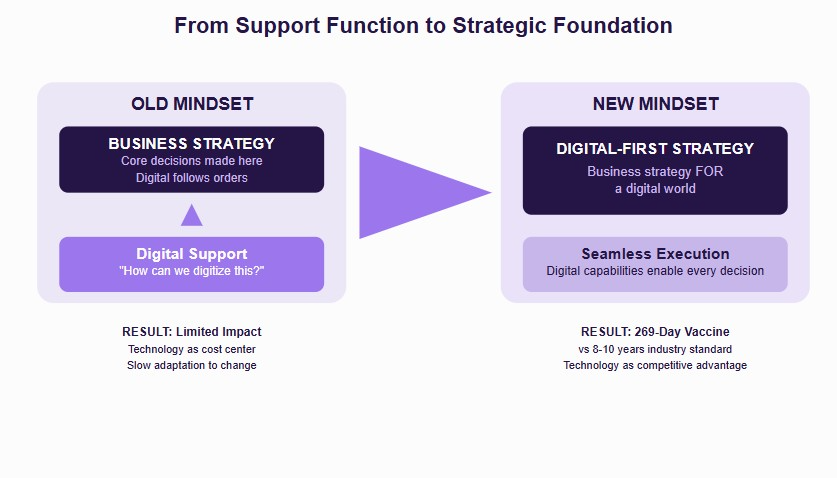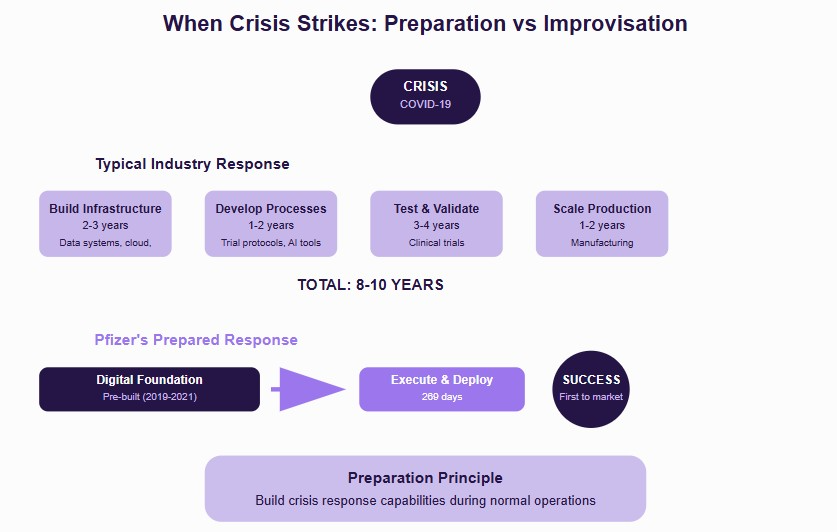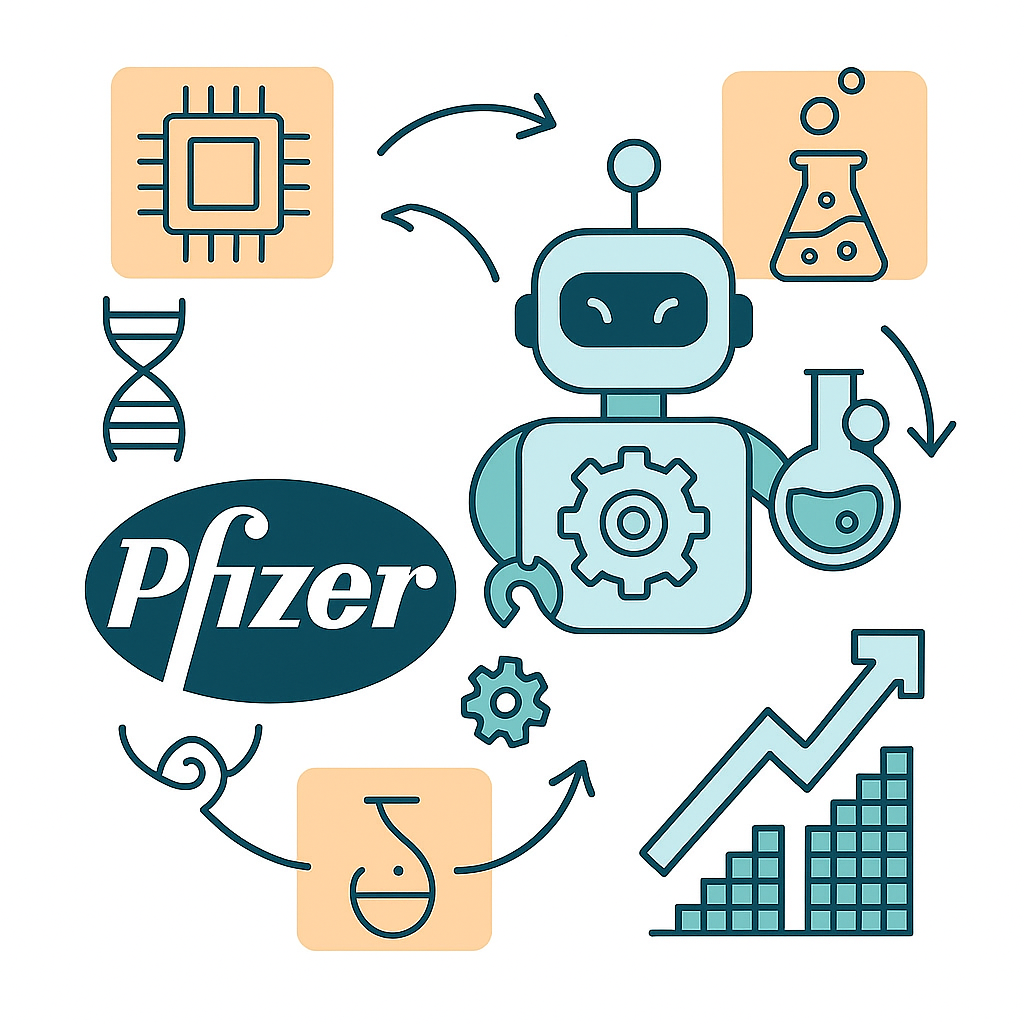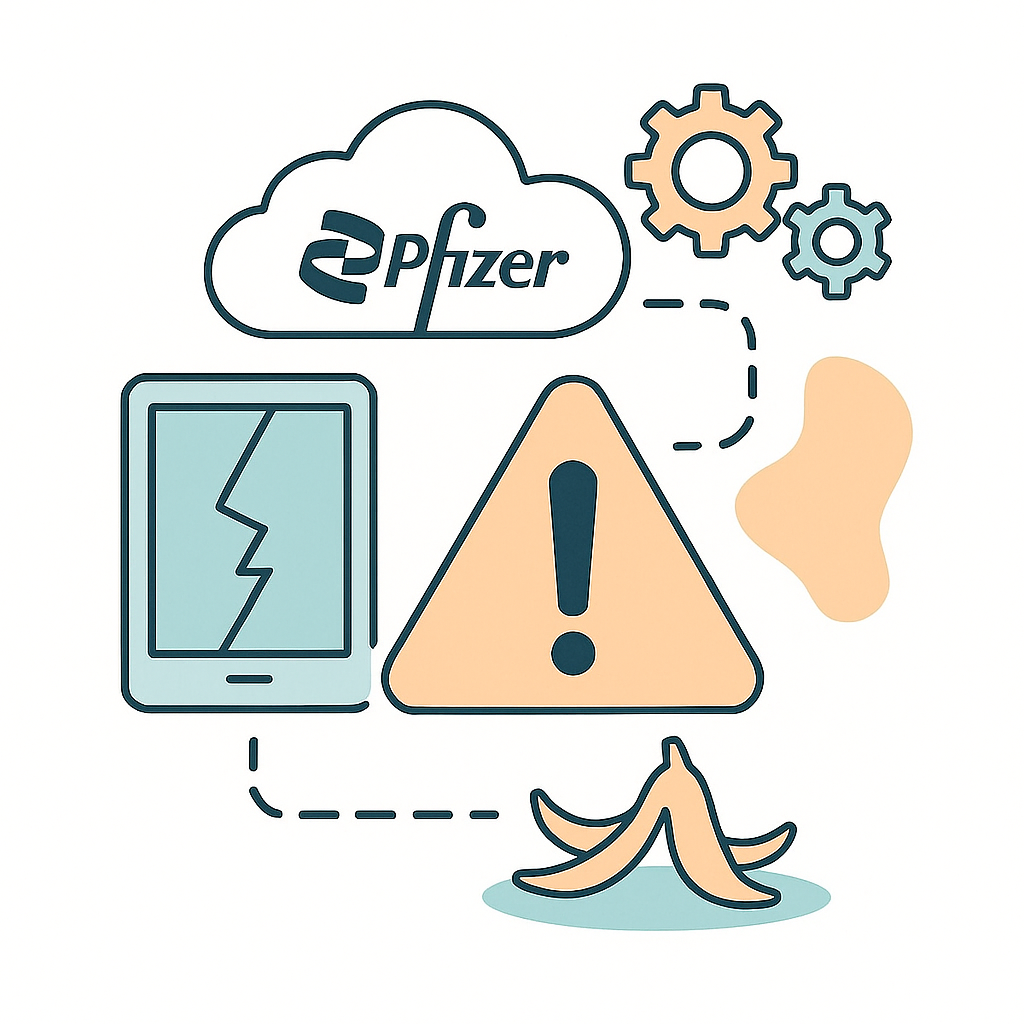Pfizer processes over 50 billion clinical data points annually, using AI and advanced analytics to accelerate breakthroughs in drug discovery and patient care. Their approach goes far beyond vaccines, redefining speed and innovation across the entire pharmaceutical landscape.
Understanding what Pfizer's digital transformation strategy can teach us reveals powerful lessons for scaling technology, driving growth, and shaping the future of global healthcare.
In this article, we will:
- Discover 7 powerful lessons from Pfizer’s digital transformation
- Explore Pfizer’s next big moves in digital innovation
- Avoid costly digital transformation mistakes with Pfizer’s insights
Pfizer's digital transformation: 7 game-changing lessons every business leader needs
Pfizer's remarkable journey from traditional pharmaceutical giant to digital-first innovator offers a masterclass in strategic transformation. Their ability to develop a COVID-19 vaccine in just 269 days, compared to the typical 8-10 years, wasn't luck, but the result of years of deliberate digital groundwork.
Here are the seven critical lessons that can revolutionize how any organization approaches digital transformation.
Lesson 1: the "digital-first business strategy" framework
Most companies make the fatal mistake of treating digital as a support function rather than a core business driver. Pfizer’s approach completely flips this conventional thinking, much like a project charter that defines direction, by making digital capabilities the foundation of every strategic decision.
Pfizer's specific approach:
- Lidia Fonseca's revolutionary principle: "It's not about creating a digital strategy for our business but about creating a business strategy for a digital world."
- Complete organizational redesign spanning all 36 plants and 149 global markets
- CEO and CTO-level ownership ensuring digital decisions drive business strategy, not follow it

Pro tip: Start your next board meeting by asking, "How do our digital capabilities enable this business decision?" instead of "How can digital support this initiative?" This simple shift in questioning forces strategic thinking rather than tactical support.
Lesson 2: the "foundation-first" implementation model
Building AI and advanced technologies without proper infrastructure is like constructing a skyscraper on quicksand. Pfizer's methodical approach proves that data centralization must precede technological sophistication.
Pfizer's specific methodology:
- Data centralization was completed across all operations before AI deployment began
- Scientific data cloud creation enabling real-time searches vs. the previous weeks/months timeframe
- Migration of 12,000 applications and 8,000 servers in just 42 weeks, as the infrastructure foundation
The key insight here is patience with planning but speed with execution. Pfizer spent months designing their unified architecture, then used IT project management software to execute the massive migration in less than a year. This foundation enabled their lightning-fast COVID response.
Lesson 3: the "strategic partnership acceleration" approach
Internal development often creates bottlenecks that partnerships can eliminate overnight. Pfizer's partnership strategy demonstrates how to achieve exponential acceleration while maintaining control over core competencies.
Pfizer's partnership strategy:
- PACT initiative with AWS saving 16,000 scientist hours annually and cutting infrastructure costs by 55%
- XtalPi collaboration for AI-powered molecular modeling significantly reducing computation time
- PostEra partnership with substantial multi-year commitment for generative chemistry acceleration
Example in action: When Pfizer needed quantum physics expertise for drug discovery, they partnered with XtalPi rather than building internal capabilities. This allowed them to access cutting-edge technology immediately while their scientists focused on pharmaceutical innovation.
Lesson 4: the "preparation-enables-speed" principle
True agility comes from preparation, not improvisation. Pfizer's record-breaking vaccine development wasn't a miracle—it was the result of years of systematic preparation meeting an urgent moment.
Pfizer's preparation framework:
- Digital infrastructure established 2019-2021 enabled 269-day COVID vaccine development vs. typical 8-10 years
- "Light-speed concepts" were ready for deployment when pandemic urgency struck
- Rapid prototyping culture with "learn, inform, and fail fast" methodology embedded across teams

The lesson is profound: build your crisis response capabilities during normal operations. When urgency strikes, you execute rather than innovate. Pfizer's success came from having the right digital infrastructure already in place.
Lesson 5: the "quantified impact" management system
Digital transformation without measurement is just expensive experimentation. Pfizer's approach proves that every initiative must deliver specific, measurable outcomes with clear ROI targets from day one.
Pfizer's measurement approach:
- $47 million annual savings from cloud migration with 4,700 tons of CO2 reduction
- Significant manufacturing throughput increases from the digital operations center
- Substantial additional vaccine doses per batch through mRNA prediction algorithms
- Computing capacity setup reduced from months to hours (60k CPUs in 1 hour)
Pro tip: Establish your baseline metrics before launching any digital initiative. Define what success looks like in numbers, not feelings. Pfizer measures everything from cost savings to environmental impact, creating a comprehensive view of transformation value.
Lesson 6: the "AI-as-business-process" integration method
Most organizations treat AI as a separate technology layer, missing its true potential. Pfizer's approach embeds AI directly into core business workflows, making it an invisible but powerful component of daily operations.
Pfizer's AI integration:
- AI has been used since 2014 for adverse event categorization in drug safety monitoring
- VOX platform with Amazon Bedrock is generating patent application first drafts
- 17 use cases spanning research, manufacturing, and marketing, with a dedicated chief AI officer
The genius lies in making AI feel natural rather than revolutionary. Scientists don't think about using AI; they simply access better, faster insights as part of their normal workflow.
Lesson 7: the "culture-first" digital adoption strategy
Technology transforms processes, but culture transforms organizations. Pfizer's recognition that human development must parallel technological advancement separates successful transformation from expensive failure.
Pfizer's culture strategy:
- Developer experience program reducing attrition risk by 33%
- Principal engineers elevated to leadership positions across key projects
- Scaling from 100 to 3,000-person digital team while maintaining an innovation culture
Example in action: When Pfizer expanded their digital team by 30x, it didn't just hire more people; they created new career paths, elevated technical leaders, and built systems to preserve knowledge. The result? Lower turnover and higher innovation in a rapidly growing team.
The ultimate lesson from Pfizer's transformation is that digital success requires strategic patience with infrastructure combined with cultural commitment to continuous learning. Their approach proves that transformation is not about technology adoption, it's about fundamental business evolution.
Where Pfizer's digital innovation is heading: The future of pharmaceutical technology
Pfizer's current investments reveal the future blueprint for digital leadership. Their experimental programs offer critical insights for business leaders planning long-term transformation strategies.

AI-powered precision medicine programs
Pfizer is shifting from one-size-fits-all treatments to individualized therapies. Their AI-driven approach analyzes patient data and genetic profiles to create personalized treatment plans.
Current initiatives:
- AI algorithms are processing millions of patient data points for optimal treatment matching
- Oncology programs identifying effective therapies based on unique tumor characteristics
- Genetic marker analysis determining treatment effectiveness before patient trials
Key insight: This represents the future of customer personalization at scale—businesses can apply similar AI-driven individualization to deliver tailored products and services across any industry.
Investment in digital therapeutics and companion apps
Digital therapeutics mark Pfizer's shift from traditional medication to software-based treatments. These FDA-approved solutions work alongside or replace conventional drugs for specific conditions.
Development focus areas:
- Companion apps providing real-time monitoring and medication reminders
- Direct communication channels between patients and healthcare providers
- Cognitive behavioral therapy algorithms treating depression and anxiety through mobile applications
Business application: Demonstrates how software can deliver core value propositions more effectively than physical products; every industry can explore digital alternatives to traditional offerings.
Experimental digital twins for drug testing
Digital twins create virtual replicas of biological systems, enabling comprehensive drug testing without human subjects. These sophisticated models simulate drug behavior across different patient populations and disease conditions.
Technology capabilities:
- Thousands of virtual trials are running simultaneously across different scenarios
- Preclinical testing time was reduced by several months while improving safety predictions
- Drug combination and dosing strategy testing before expensive human trials
Strategic takeaway: Digital twins offer risk-free experimentation opportunities; manufacturing, logistics, and service companies can create virtual replicas to test operational improvements without disrupting actual business processes.
Global expansion of the center for digital innovation
Pfizer's CDI has become the global hub for pharmaceutical digital innovation. The center manages over 200 simultaneous projects while expanding internationally to create distributed innovation networks.
Expansion strategy:
- Regional centers focusing on local healthcare challenges while contributing globally
- Open innovation approach, partnering with startups, universities, and technology companies
- Distributed risk model spreads development costs across multiple collaborative partners
Leadership lesson: Creating dedicated innovation centers with clear mandates and sufficient resources enables sustained digital experimentation while balancing local needs with global capability development.
Digital transformation mistakes: what Pfizer learned the hard way (so you don't have to)
Even pharmaceutical giant Pfizer stumbled before achieving digital transformation success. Understanding their early missteps provides invaluable insights for avoiding costly mistakes that derail transformation initiatives.

Failed initiatives before breakthrough success
Pfizer's transformation wasn't immediate perfection. Before their record-breaking COVID vaccine development, several digital initiatives fell short of expectations, teaching critical lessons about strategic planning.
Early challenges Pfizer faced:
- Multiple disconnected pilot programs that didn't scale beyond initial departments
- Attempting to digitize processes without first addressing underlying data fragmentation
- Rushing AI implementation before establishing a proper cloud infrastructure foundation
How they course-corrected: Pfizer shifted from scattered experimentation to centralized strategy execution. They established clear governance structures and required every digital initiative to align with core business objectives before receiving funding.
Key takeaway: Start with strategy, not technology. Define your digital vision before investing in specific tools or platforms.
Budget overrun prevention strategies
Digital transformation projects are notorious for exceeding budgets by 200-300%. Pfizer developed systematic approaches to prevent cost spirals that destroy transformation ROI.
Pfizer's budget control methods:
- Phased investment approach with clear success metrics before next phase funding
- Partnership strategy reducing internal development costs by 55% through AWS collaboration
- Pilot program validation before full-scale deployment across 36 global plants
Budget discipline example: Instead of building internal AI capabilities from scratch, Pfizer partnered with specialized companies like XtalPi and PostEra. This approach provided immediate access to cutting-edge technology while avoiding massive internal R&D investments.
Implementation tip: Establish kill criteria for each initiative, specific metrics that determine whether to continue, pivot, or stop projects before they consume excessive resources.
Technology integration without system chaos
Legacy system integration represents the biggest technical hurdle in digital transformation. Pfizer's methodical approach prevented the system conflicts that typically derail enterprise transformations.
Integration challenges overcome:
- Unifying 30+ legacy pharmaceutical company systems from previous acquisitions
- Migrating 12,000 applications and 8,000 servers without operational disruption
- Maintaining regulatory compliance during a 42-week infrastructure transformation
Pfizer's integration strategy: They created detailed system mapping before beginning migrations, identified critical interdependencies, and established fallback procedures for every major system change.
Pro tip: Never underestimate integration complexity. Plan for 20% longer timelines than initial estimates and maintain parallel systems until new infrastructure proves stable.
Overcoming employee resistance and adoption barriers
Technology changes processes, but people determine success. Pfizer recognized that cultural resistance could undermine even the most sophisticated digital initiatives.
Cultural challenges addressed:
- Developer attrition risk during rapid team scaling from 100 to 3,000 people
- Scientist skepticism about AI replacing traditional research methodologies
- Cross-departmental coordination across 149 global markets
Employee adoption strategies:
- Principal engineer elevation to leadership positions, creating technical career advancement paths
- Comprehensive training programs demonstrating AI as a workflow enhancement, not replacement
- 33% reduction in attrition risk through improved developer experience programs
Success factor: Pfizer invested heavily in change management alongside technology implementation. They communicated transformation benefits clearly and provided continuous skill development opportunities.
Digital transformation failures aren't usually about technology; they're about inadequate planning, unrealistic budgets, poor integration strategies, and insufficient attention to human factors. Pfizer's early mistakes became the foundation for its later breakthrough success.
Unlock innovation by adopting Pfizer’s winning strategies
Pfizer’s transformation proves that digital success comes from bold strategies and flawless execution.
By embracing AI-driven insights, cloud-powered infrastructure, and strategic partnerships, Pfizer accelerated innovation and scaled globally while maintaining quality. Their approach highlights that transformation is about empowering people, reshaping culture, and achieving measurable outcomes.
Businesses can apply Pfizer’s tactics by building solid data foundations, integrating AI into workflows, and investing in talent. These strategies enable organizations to drive growth, enhance efficiency, and stay ahead in today’s competitive digital landscape.


.png)
_light%201.png)





